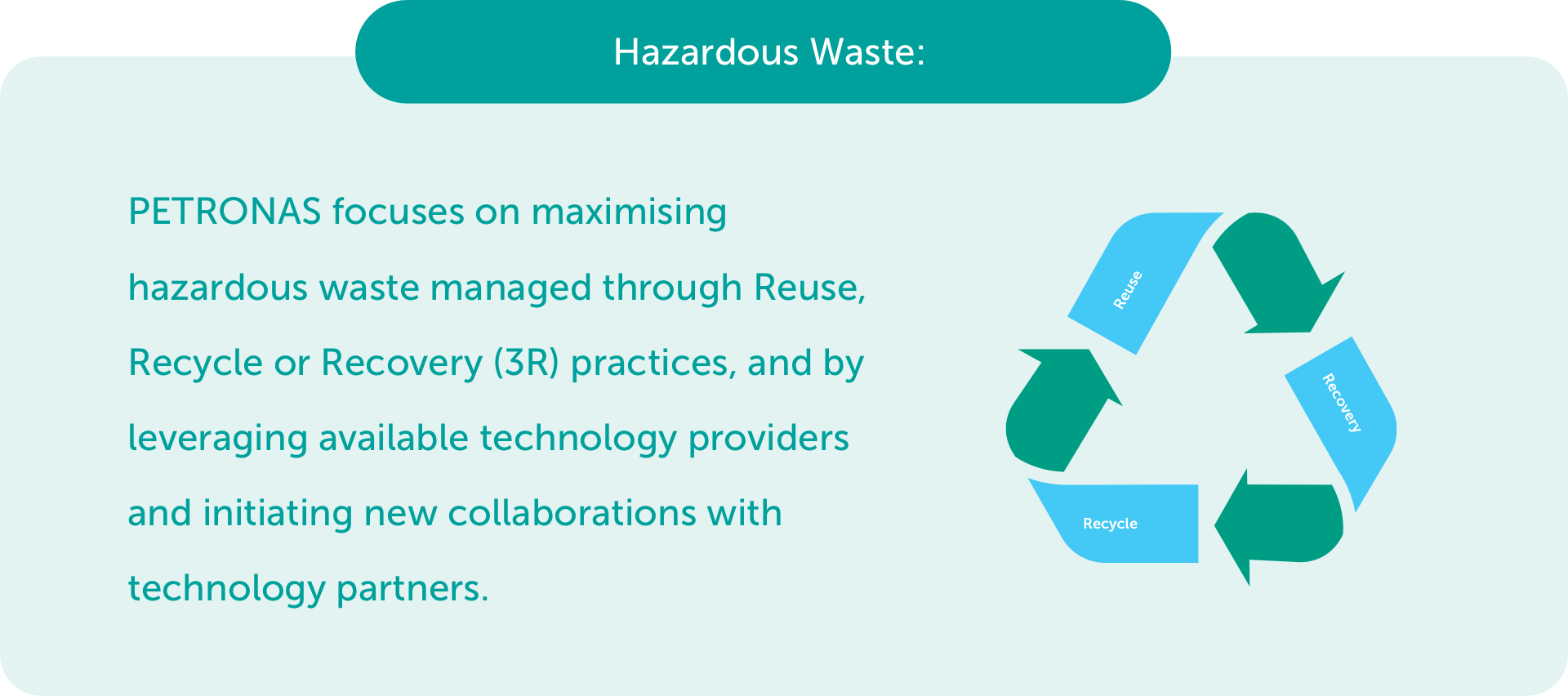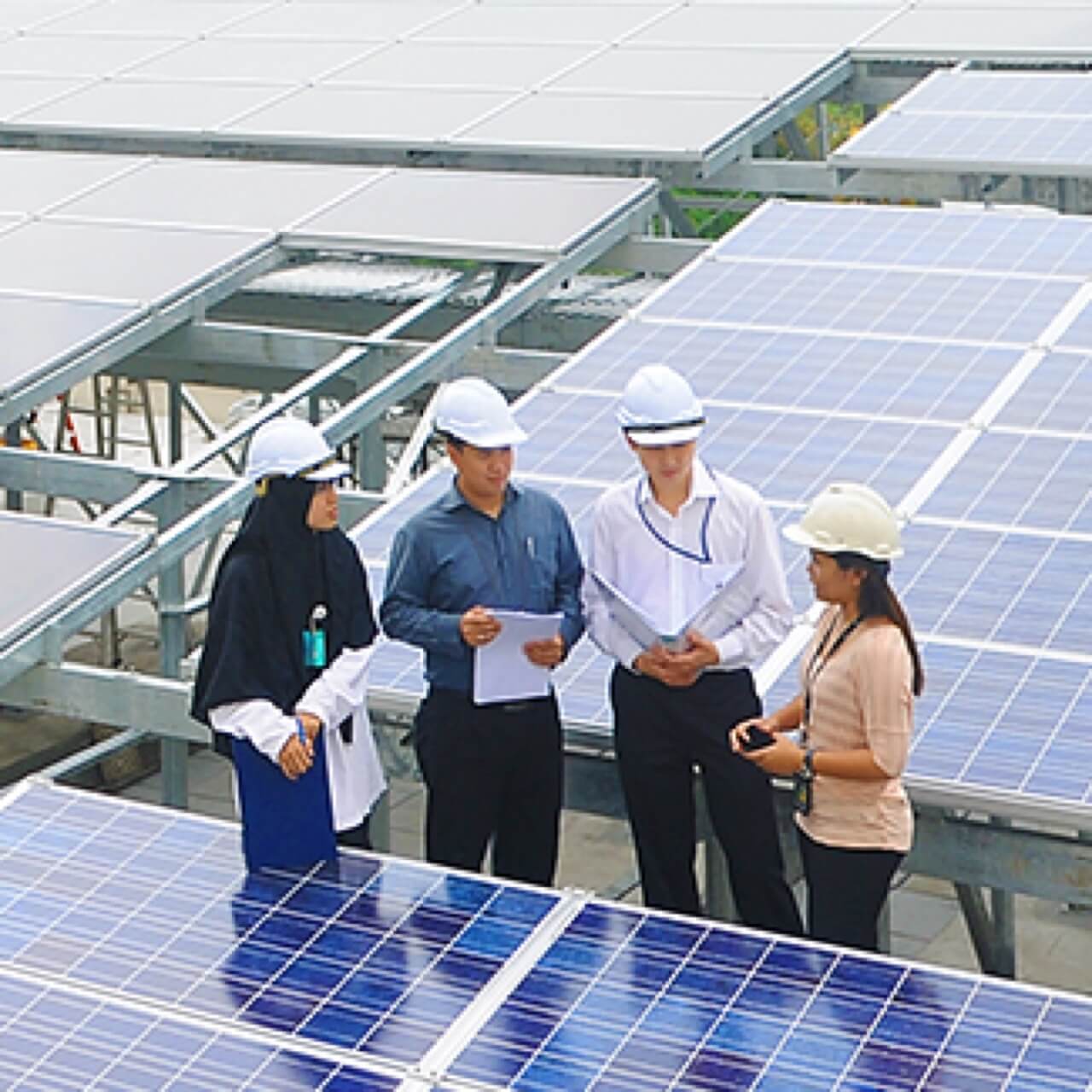What are PETRONAS' hard targets under the Sustainability Agenda?
In reducing greenhouse gas (GHG) emissions, PETRONAS continues to reduce flaring, hydrocarbon venting and drive energy efficiency improvements in our operations, while embarking on flare and vent reduction projects.
A significant move PETRONAS has made in the solar energy space is the 100 per cent acquisition of Amplus Energy Solutions Pte Ltd (M+) with its customisable and affordable solar solutions. Project SINARAN (Solar Installation and Application on PETRONAS Rooftops and Assets Nationwide) further add to the installed capacity of solar PV systems.
Yayasan PETRONAS undertakes a variety of corporate social responsibility (CSR) activities anchored on Sentuhan Ilmu, Sentuhan Harapan and Sentuhan Alam. The series of Sentuhan Ilmu programme is aimed at to improve the educational outcomes and provide more opportunities for underprivileged students.
1. Sustainability is a timely topic to discuss now that the world is in the midst of containing a global pandemic. While often associated with the environment and climate change, its scope is far wider. What does being sustainable mean for an organisation?
Sustainability has been a growing area of interest for many parties, its close link to climate action has a lot to do with the fact that the environment is the top agenda for many organisations, and has been advocated widely and prominently by financial institutions, activists and international organisations alike.
However, when organisations take on sustainability, we must look at it from the broader perspective as posited by the 17 United Nations Sustainable Development Goals (SDGs), which cover a lot more ground. It approaches the topic in a very comprehensive manner, touching on education, equality, well-being, and even governance.
For PETRONAS, sustainability is about conducting our business responsibly to bring benefits to society and the environment, while ensuring efficient delivery of cleaner energy through technological innovation. I believe that in this time and age, sustainability is a natural prerequisite for any company that has long-term growth in mind.
2. What was the catalyst that led to the creation of the PETRONAS Sustainability Agenda? Considering PETRONAS has been addressing sustainability for over 20 years how is this different?
As a Group, we have been doing a lot of things under the umbrella of being a sustainable organisation, but all these efforts were executed in a bottom-up manner. Throughout our organisation, we have been carrying out a lot of CSR programmes for the community, we have also internally pursued operational excellence and efficiency in reducing flaring and venting in our plants, all orchestrated at the business and corporate level.
In 2001, we introduced the PETRONAS Corporate Sustainability Framework that had focused on the three aspects of economic, social and environmental sustainability. We also established a Sustainable Development Department to orchestrate our sustainability efforts in PETRONAS at a Group level. Subsequently, the Corporate Sustainability Council (CSC) was created to deliberate on sustainability policies and strategies with key leadership from business and corporate functions. As initial focus was more on environmental performance and maximising value, we achieved cumulative energy savings of 17.9 million MMBtu from 2006 to 2009 through an energy loss management system.
The PETRONAS Carbon Commitments and Human Rights Commitment were then introduced to give more focus and commitment to drive efforts in specific areas of climate change and social performance. But we realised that these efforts can be orchestrated better with a wider scope and more inclusiveness. We needed to strengthen our top-down sustainability direction. A lot has been done, but the impact must be more pronounced among our employees.
Today, more than ever, we are also faced with stringent stakeholders’ expectations for rigorous environment, social and governance (ESG) performance, measures and transparency in reporting.
This prompted the introduction of the PETRONAS Sustainability Agenda last October to provide a top-down direction, aimed at effectively incorporating sustainability into the businesses’ strategic decision-making on growth, operational excellence and assessment of risks.
Our commitment towards sustainability comprises four (4) Sustainability Lenses namely Continued Value Creation, Safeguard the Environment, Positive Social Impact and Responsible Governance outlined in the Agenda. These lenses will help guide groupwide operations towards a balanced ESG approach as we strive to capture new opportunities, develop better solutions to respond to the risks while adding value to the lives of people. As measurements for the lenses, three key targets have been disclosed.
The Agenda is also anchored on seven SDGs that have been prioritised out of the 17 SDGs.
- SDG 3 (Good Health and Well-Being)
- SDG 4 (Quality Education)
- SDG 7 (Affordable and Clean Energy)
- SDG 8 (Decent Work and Economic Growth)
- SDG 9 (Industry, Innovation and Infrastructure)
- SDG 12 (Responsible Consumption and Production)
- SDG 13 (Climate Action)
Our Sustainability Agenda resonates with the PETRONAS Statement of Purpose which describes our resolution to be a progressive energy and solutions partner enriching lives for a sustainable future.
3. "How does increasing Renewable Energy (RE) capacity affect PETRONAS’ operations? Do you foresee the energy mix to skew towards renewables in the near future?
We have already taken steps towards RE with the establishment of the Gas and New Energy division to oversee RE and low-carbon fuels such as natural gas and liquefied natural gas (LNG).
PETRONAS is promoting the use of natural gas and LNG, a low-carbon fuel that can reduce Malaysia’s national electric grid emissions. Natural gas is Malaysia’s largest source of energy, providing nearly half of the fuel required for power generation and a third of the industrial sector’s energy needs. The company made a significant move into the RE space with the acquisition of a leading Singapore-based company, Amplus Energy Solutions Pte Ltd (M+). M+ has a 40 portfolio of distributed RE assets in Asia, with a total capacity of 600 megawatt under operation and development.
In Malaysia, we expanded our solar portfolio with the installation of solar photovoltaic (PV) panels with a total capacity of 207 kilowatts at the Pengerang Integrated Complex (PIC) and also Project Solar Installation and Application on PETRONAS Rooftops and Assets Nationwide (SINARAN) with identified potential for 30 megawatt - all to reduce indirect GHG emissions from electricity purchase from the grid.
In January this year, PETRONAS has also announced a 5 per cent allocation of CAPEX for RE. With that said, fossil fuels are expected remain core to the global energy mix for some time to come. We estimate it to constitute more than 50 per cent in 2024.
However, as we experience a period of low Brent prices, compounded by the effect brought upon by the COVID-19 pandemic, energy companies would need to address the energy trilemma of ensuring affordability, security of supply, and maintaining our commitment to sustainability.
This is a challenge for all of us, and it will take a concerted effort from all parties - the government through its policies, the consumers through their choices, and the energy companies through their business activities - to make the leap towards sustainability.
4. What are the financial or profitability factor that compels companies to embrace sustainability?
There are many success stories, and studies, that have shown how sustainability in a business can create long-term value, and ultimately attract new talents, improve stakeholders' confidence and generate return on capital through sustainable products as well as ongoing operational excellence. In essence, operating responsibly and sustainably, and taking care of our employees and the environment are actions that help us build trust with our stakeholders and the community, thus giving us the license to operate.
Beyond that is having the license to grow as an organisation. An organisation does not stand a chance to continue to be profitable and relevant - or even to exist, for that matter - without embracing sustainability.
5. As energy companies work on reducing its carbon footprint, will their operations be affected? Will that ultimately affect revenues?
I don’t think it will affect operations. Being sustainable will require organisations to make responsible decisions while striking a balance between economic benefits, the environment and community well- being. We will inevitably be presented with challenges, because GHG emissions are contributed by flaring and venting, as well as combustion of fossil fuel at plant operations. Our plants have already been operating at high levels of plant efficiency and overall equipment effectiveness (OEE). This means that our Downstream and GNE businesses’ energy cost is optimised and it would be a challenge to achieve significant savings or GHG reductions.
However, there are still opportunities in Upstream to monetise the hydrocarbon gasses to reduce flaring and venting through fixing passing valves, installing recovery compressors, or even reinjection of gas for enhanced oil recovery.
Hydrocarbon flaring and venting reduction were the main contributors to overall GHG reduction when we set our GHG reduction targets at 49.5 million tCO2e for 2024. Further to this, the target will also necessitate us to continue to review our field development programme and explore carbon capture, utilisation and storage (CCUS) technology to prevent CO2 from entering the atmosphere.
Looking at it from another angle, improving our operational efficiency and our venture into RE are expected to contribute to new streams of revenue. By upholding sustainability through compliance with regulations and conducting businesses responsibly, we can build trust among stakeholders which will positively affect our long-term business objectives.
6. Do you foresee energy companies diverting from their Sustainability Agenda, driven by effects of the COVID-19 pandemic and low Brent prices?
I believe that sustainability will continue to be a priority, but the base targets or the pace at which we progress may be affected by the circumstances at hand.
In situations like today with the COVID-19 pandemic, companies’ priorities might shift to humanitarian survival, while the environmental-focus matters become the baseline activities. It is important to be agile to react to these unforeseen circumstances so that we may survive long enough to equally make progress in other areas in the long run.
Sustainability is no longer a choice, and for energy players like PETRONAS, transitioning to a low-carbon future requires us to strike the optimal equilibrium, providing energy in a secure, affordable and sustainable manner while contributing to economic growth and a better quality of life.
7. What was the single biggest challenge that you have faced in this journey towards sustainability?
We must make sustainable development pervasive in our organisation, and to do that, we must make sustainability a part of our organisational culture. This is a key factor for success.
In this, we have our work cut out for us because the concept of sustainability has yet to be fully embraced in the hearts and minds of people, and integrated into the way we do things. What we need is to form a culture where sustainability becomes our way of life and the way we work in this organisation. It should be at the top of everyone’s mind, almost intuitive even.
People always equate sustainable development to the environment or climate change. That is the most widely talked about aspect all over the world. But what they don’t realise is that everything that we are doing now contributes towards sustainable development, for example plant OEE, our CSR efforts, governance and reporting, and waste reduction. Perhaps what we need to do is to create the link and make it clearer for everyone to understand.
To achieve this, communication is key; not just any kind of communication, but one that is driven by leaders. We need to create more avenues for two-way conversations about sustainability among all levels within the organisation. Everything that we do contributes towards our Sustainability Agenda. If we are able to shape people’s attitudes towards sustainable development, I believe that it should not be too difficult to integrate sustainability into our business strategies and processes.















